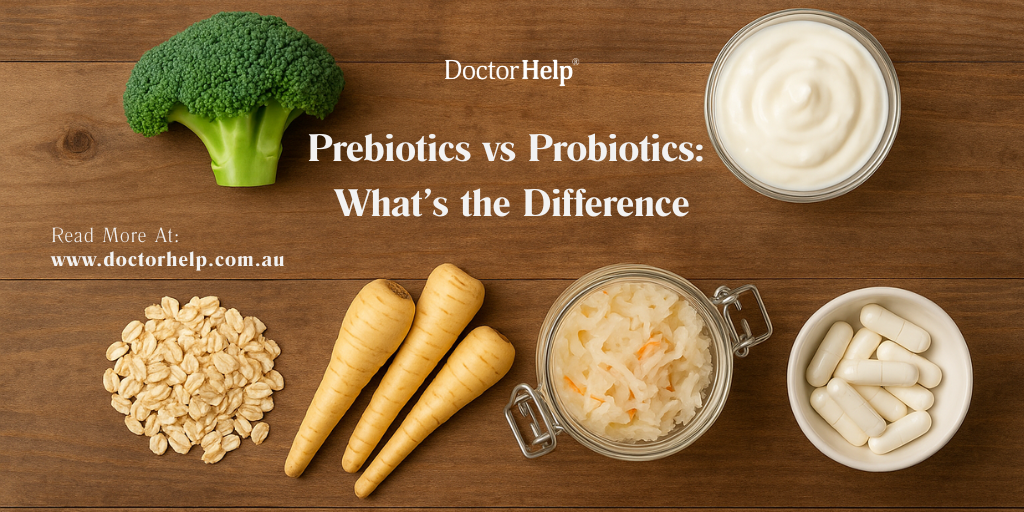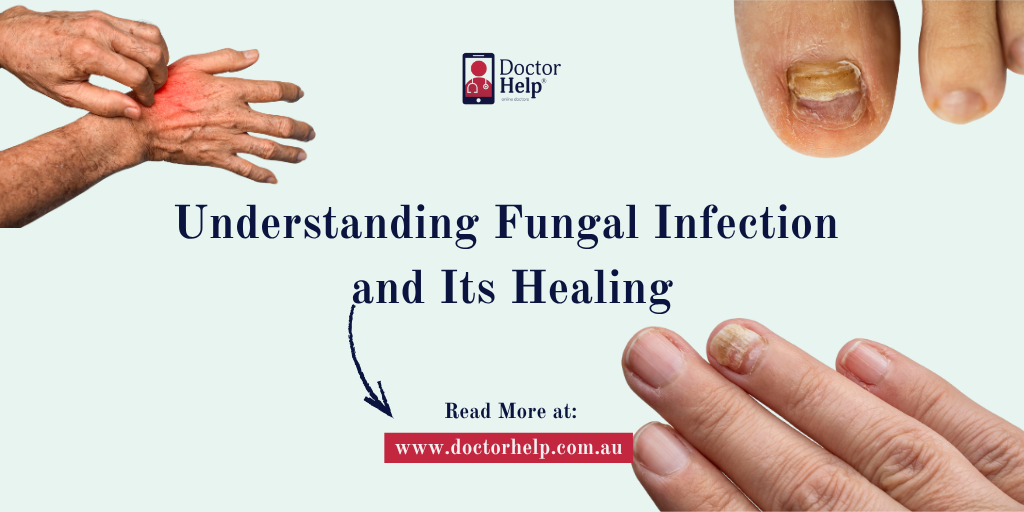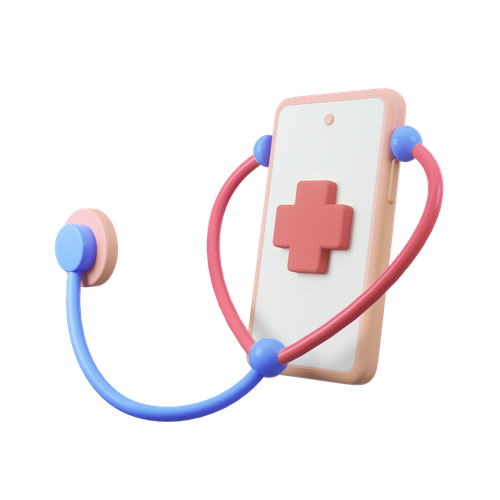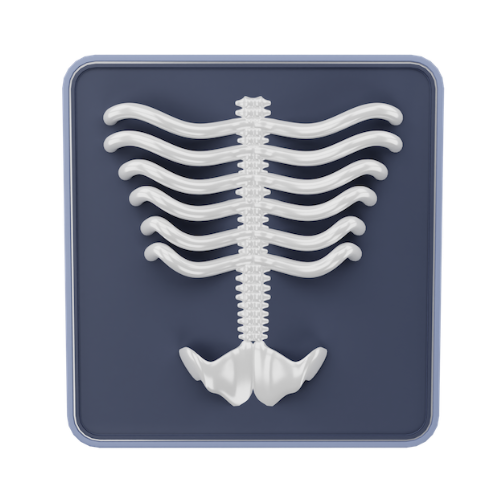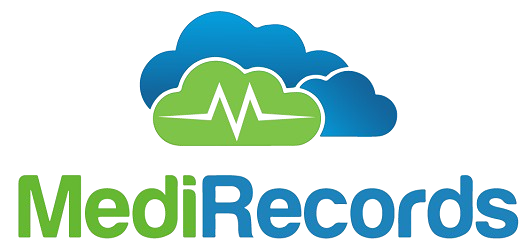Table of Contents
Prebiotics and probiotics, the gut’s most talked-about allies.
From supermarket shelves to health blogs, these terms appear everywhere. But now it’s time to zoom in on a question many still quietly carry:
What’s the difference between prebiotics and probiotics and why do both matter?
You’re not alone if the terms blur. They live side by side on supplement shelves, health food labels, and blogs. And yet, very few explain them in a way that speaks to not just your intellect, but your intuition, the part of you that’s been feeling something is off. Maybe it’s the bloating. Maybe it’s the fog. Or maybe it’s the sense that your body is doing its best with too little support.
Let’s break this down clearly, and maybe, more kindly too.
Your Gut Is Not Just About Digestion
It’s easy to think of the gut as just a tube that processes food. But truthfully, it’s more like an orchestra. A living, breathing system made up of trillions of microbes; bacteria, yeasts, fungi, all playing different instruments in your body’s internal symphony.
When this gut microbiome is in harmony, it supports everything from:
- Energy levels and sleep
- Skin clarity
- Hormonal balance
- Emotional well-being
- And of course, smooth digestion
But like any orchestra, it needs the right environment. And that’s where probiotics and prebiotics come in.
What Are Probiotics?
Imagine you’re trying to restore a struggling garden. You need to plant new seeds, living things that will bring life back to the soil. That’s what probiotics do for your gut.
Probiotics are live, beneficial bacteria that help populate your gut microbiome. They offer protection, balance, and support. According to Healthdirect Australia, probiotics can:
- Reduce the symptoms of irritable bowel syndrome (IBS)
- Aid digestion after a course of antibiotics
- Support immune function
- Help prevent or reduce some types of diarrhoea
Common probiotic strains include:
- Lactobacillus
- Bifidobacterium
- Saccharomyces boulardii
You’ll find them naturally in:
- Yoghurt (with live cultures)
- Kefir
- Sauerkraut and kimchi
- Miso and tempeh
And of course, in targeted supplements; some designed for general health, others for specific groups like probiotics for women, supporting urinary or vaginal balance.
But here’s where many people go wrong: popping probiotics and expecting a miracle. Without a healthy environment to thrive in, these good bacteria often pass through unnoticed. That’s where prebiotics make their entrance.
Read: Top 10 Probiotic Foods To Improve Digestion Naturally
What Are Prebiotics?
If probiotics are seeds, prebiotics are the compost. They’re the non-digestible fibres that feed the good bacteria in your gut, helping them grow, multiply, and work effectively.
Prebiotics are found in many plant-based foods, including:
- Garlic and onions
- Asparagus
- Green bananas
- Leeks
- Oats
- Chicory root
They’re not trendy. They don’t come with fancy labels. But without them, your probiotics don’t stand a chance.
You might think of prebiotics and probiotics as partners, one cannot shine without the other. This is the difference between prebiotic and probiotic that truly matters. One plants, the other nourishes.
Biome Probiotics, Synbiotics, and Gut Wisdom
You may have seen the term biome probiotics floating around; referring to probiotic blends formulated specifically to restore the microbiome after antibiotics, stress, or gut imbalance.
Some products also include synbiotics: supplements combining probiotics and prebiotics together to give your gut both the bacteria and the food they need.
Australian guidelines advise choosing supplements carefully:
- Look for strains backed by clinical studies
- Choose TGA-listed products (Therapeutic Goods Administration)
- Be wary of exaggerated health claims
- And remember: the gut is deeply individual
Not every probiotic works for everybody. Sometimes, you need to slow down and listen.
Before starting any new supplement, especially if you have existing health conditions, it’s best to consult with your doctor or a qualified dietitian to ensure it’s safe and appropriate for your needs.
How Do I Know What My Gut Needs?
This is not just about labels. It’s about you.
Do you:
- Bloat after meals you used to tolerate?
- Feel sluggish, mentally or physically?
- Get frequent infections or skin flare-ups?
- Notice more anxiety or low mood without obvious cause?
These could be signs of a gut imbalance or what we call dysbiosis.
Sometimes food is enough. A shift toward whole, unprocessed meals, plenty of fibre, fermented foods, and rest can begin the healing process.
But when symptoms persist, working with a practitioner who understands gut health at both a clinical and human level can help you choose the right support whether that’s gut health supplements, lifestyle changes, or diagnostics like stool testing.
Also read our guide: Gut Health 101: How To Heal Your Gut Naturally
The Risk of Taking the Wrong Thing
There’s a fine line between helping your body and overwhelming it. Not all probiotics are created equal. Some high-potency formulas can cause bloating or discomfort, especially if your gut lining is sensitive or inflamed.
Prebiotics, too, can backfire if introduced too quickly.
(Think: more gas, more discomfort, more frustration.)
This is why personalised guidance matters. Your body is not a one-size-fits-all system. It’s a story and your gut plays a lead role.
So, Do You Need Both?
Most people benefit from both prebiotics and probiotics, but not always at the same time or in the same dose.
In general:
- If your gut feels inflamed or sensitive, start slow
- Begin with gentle prebiotic foods and observe your response
- If you’re recovering from antibiotics, consider a short course of biome probiotics
- If your symptoms are ongoing, consider a telehealth consultation to assess what’s really going on beneath the surface
Remember, gut health is not about chasing perfection. It’s about tuning in, about learning to hear your own body’s rhythm again.
Final Word: Your Gut Is Trying to Tell You Something
Maybe you’ve been ignoring the discomfort for too long. Maybe you’ve bounced between diets and supplements without lasting relief. Maybe you’re just now realising that your gut isn’t just about digestion; it’s about how you feel, think, move, and rest.
This isn’t about trends. It’s about trust.
The kind you rebuild with your body when you start to care for it in a way that feels both wise and gentle.
So if your gut is speaking; through fatigue, through bloating, through brain fog or low mood, listen closely. There’s knowledge in that discomfort.
And there is help.
If your gut has been carrying more than it should, maybe it’s time to give it the care it’s been quietly asking for. Book an appointment with one of our trusted telehealth clinicians and take the first step toward feeling at home in your body again.
References:
- Professional, C. C. M. (2025, May 9). Gut microbiome. Cleveland Clinic.
https://my.clevelandclinic.org/health/body/25201-gut-microbiome - Healthdirect Australia. (n.d.). Probiotics. Healthdirect.
https://www.healthdirect.gov.au/probiotics - Clinic, C. (2025, June 17). Prebiotics vs. Probiotics: What’s the Difference? Cleveland Clinic.
https://health.clevelandclinic.org/prebiotics-vs-probiotics-whats-the-difference - Hungler, C. (2025, June 30). How to heal your gut after antibiotics. Tri State Gastroenterology Associates.
https://tristategastro.net/how-to-heal-your-gut-after-antibiotics/

